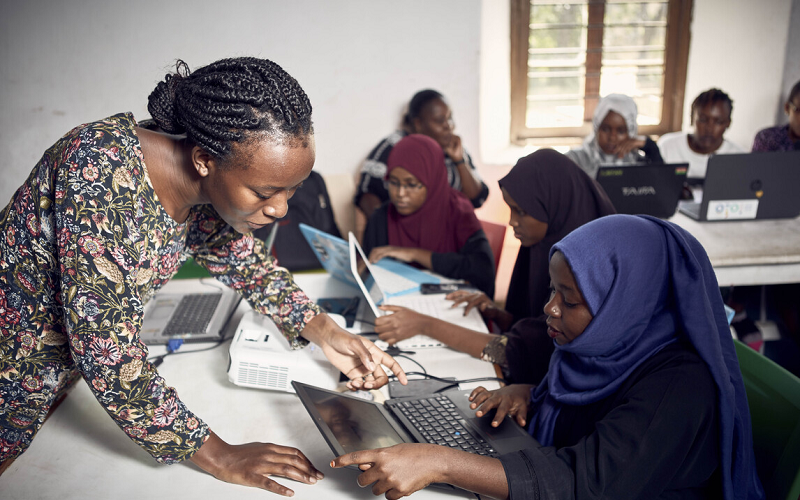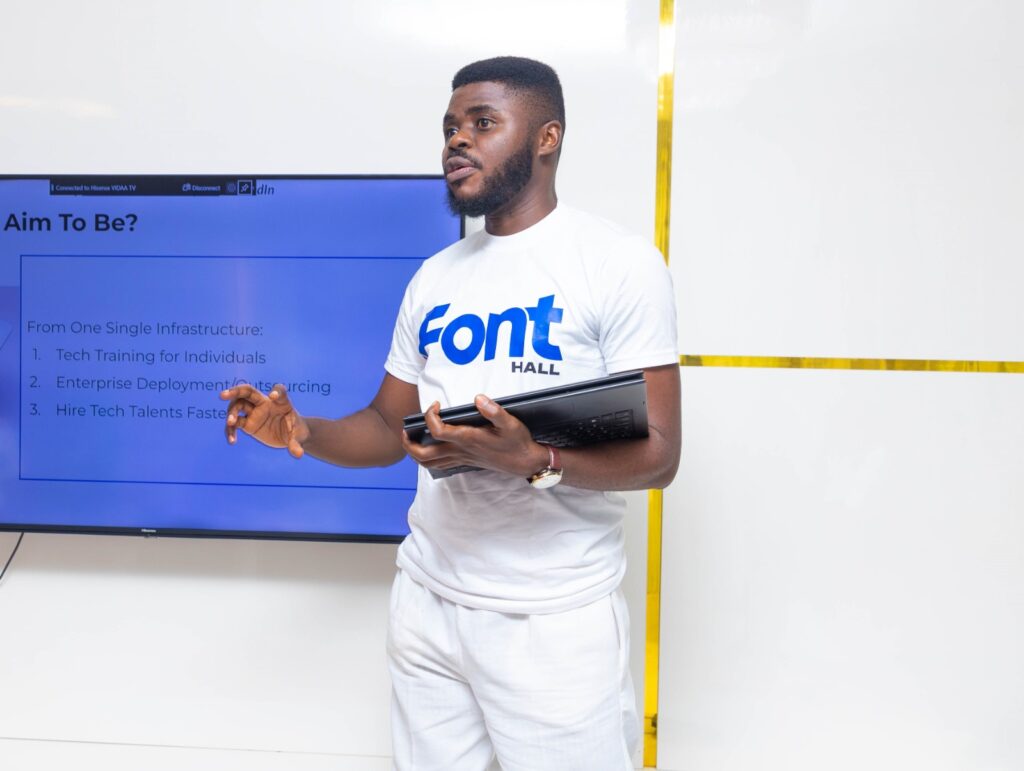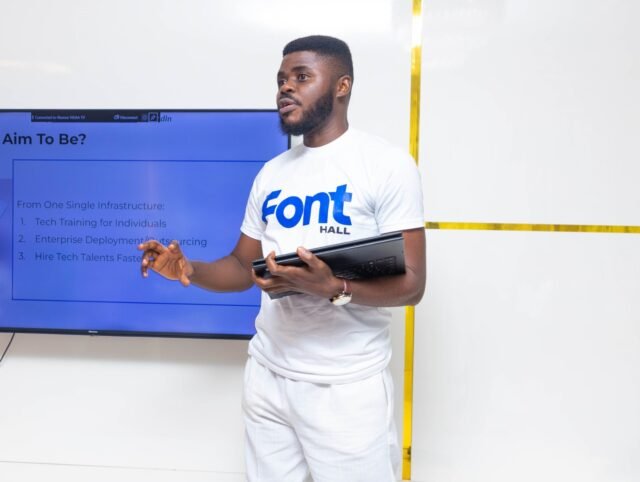In a bold, forward-thinking move to upskill young professionals and tech enthusiasts across Africa, Font Hall—one of the continent’s leading tech-training accelerators—has teamed up with The Future Project, a nonprofit committed to unleashing youth potential. Together, they hosted a two-day Virtual Tech Bootcamp titled “Re‑Imagining Your Career with Tech” on July 19–20, 2025, from 2 PM to 5 PM WAT each day.
Table of Contents

Bridging the Digital Divide
The initiative marks a critical response to Africa’s tech-illiteracy crisis. Today, an estimated three in four African youths lack essential digital skills necessary for thriving in the modern workforce. With McKinsey’s projection of 230 million digital jobs emerging in Sub‑Saharan Africa by 2030, the consequences of skills gaps could be profound, especially in Nigeria, where 35–45% of jobs will require digital literacy by the decade’s end.
Font Hall has set an ambitious target: to train 200,000 industry-ready tech professionals by 2030, leveraging real-world, project‑based curriculum. Through tools like their proprietary AI Career Assessment Test and modules in Data Science, Analytics, Artificial Intelligence, software engineering, and UX/UI design, Font Hall prepares participants not just for local roles but for global competition.
A Curriculum Powered by Career Relevance
This bootcamp featured facilitators from distinguished companies such as Google, Microsoft, and Deloitte, bringing practical insights into the evolving tech economy. Aimed at both technological newcomers and seasoned career professionals, the sessions emphasised hands‑on learning, project simulation, and direct mentorship to translate technical knowledge into marketable capability.
“We’re empowering African talents to lead the global tech revolution,” emphasised Bode Maxwell‑Akinyemi, Founder and Chief Executive of Font Hall.
Youth Empowerment at the Core
Partnering with The Future Project, known for its mission of enabling youth-led innovation, tech-forward leadership, and social entrepreneurship, significantly magnified the bootcamp’s reach. The Future Project’s platform has been instrumental in shaping a generation of young Nigerians who are impact-minded and future-ready.
This collaboration offered participants not only technical aptitude but a refreshed sense of purpose—encouraging them to engage with emerging economic opportunities, digital careers, and personal leadership beyond conventional academic pathways.
Real Stakes: Changing Africa’s Economic Trajectory
The importance of such efforts cannot be overstated. The Brookings Institution estimates that bridging digital inclusion across Africa could contribute up to $1.5 trillion to the continent’s GDP by 2030.
By equipping youth with tech fluency, projects like this can reduce unemployment, stanch brain drain, and spark homegrown innovation. In Nigeria—where youth unemployment remains a pressing threat—initiatives anchored in digital education and practical training can help curb escalating social and economic instability.

A Modern Approach to Skill Building
Font Hall’s model stands apart for its combination of automation, assessment, and adaptive skill pathways. The AI Career Assessment Test helps professionals understand their competencies while recommending personalised tracks aligned with labour market needs. Sessions blend theory with immediate application, including project simulation, case studies, and real coding and design assignments. Such a structure is designed to foster both confidence and competence.
Participants also gained exposure to networking with industry experts, which amplifies their potential for job placement or entrepreneurial ventures. The hands-on nature and mentorship-backed environment also fostered a community mindset around collaborative growth and continuous improvement.
Youth Voices: Hunger for More Than Certificates
A growing discourse among African youth reveals a shift: certificates no longer guarantee opportunity—skills do. From WhatsApp groups to professional forums, a common question now is: “What comes after that degree? Is it enough? How do I build a career that matters?”
This bootcamp sought to answer that call. It empowered attendees to move beyond token credentials toward meaningful, skill-based transformation. Topics like AI, data, and software were less abstract—they became the foundation for real-world problem-solving and opportunity creation.
Why It Works: Combining Tech, Trade, and Tenacity
The synergy between Font Hall and The Future Project reflects a broader philosophy essential to empowering African youth: the union of tech, entrepreneurial trade, and tenacity.
- Tech equips them with tools to build and compete.
- Trade gives them a means to monetise these skills through freelancing, startups, or structured careers.
- Tenacity prepares them for the rigours of growth: rejection, setbacks, iteration,and progress.
This trio—sometimes called the skill set of tomorrow—is what today’s youth crave and what Africa’s future demands.
Looking Ahead: Scaling Impact
While the bootcamp was a short, sharp initiative, its ambition echoes broader goals. Font Hall aims to reach 200,000 tech-ready professionals by 2030, and collaborations like this serve as proof points for scalable, inclusive digital education across the continent.
Key to its impact is not just the technical training, but also its alignment with global demand. Graduates can now compete for international roles in analytics, development, and innovation in hardware or software environments. The combination of practical application, soft skills, and a global lens gives these young professionals an edge.

Conclusion
In August 2025, Africa faces a moment of unprecedented opportunity—and enormous urgency. With demographic weight, economic possibility, and digital transformation all converging, the question is not whether African youth will rise, but how—and with what preparation.
Font Hall and The Future Project have chosen to meet that moment head-on. The July bootcamp is more than a two-day course. It’s a template of mentorship-first delivery, digital-first pedagogy, and youth-first empowerment. It reframes career building from passive learning to active transformation, allowing Nigeria’s and Africa’s youth to not just enter the tech economy, but to shape it.
As Maxwell‑Akinyemi put it: “[We’re empowering African talents to lead the global tech revolution.]” With programs like this, that mission starts in earnest—and grows through every student who joins, every skill unlocked, and every future reimagined.
Join Our Social Media Channels:
WhatsApp: NaijaEyes
Facebook: NaijaEyes
Twitter: NaijaEyes
Instagram: NaijaEyes
TikTok: NaijaEyes















![Tragic Incident: Fans of Seyi Vibez Die in Fatal Accident After Electrifying Lagos Concert [VIDEO] Seyi Vibez](https://naijaeyesblog.com/wp-content/uploads/2025/08/Seyi-Vibez-180x135.avif)
























